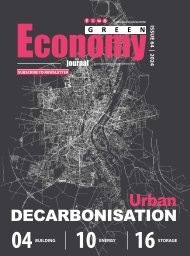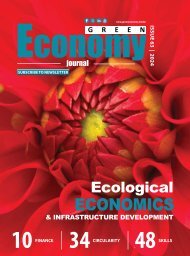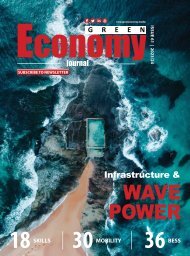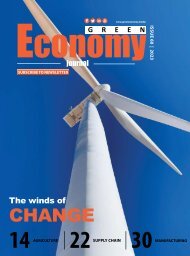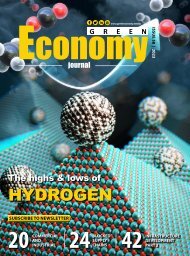Green Economy Journal Issue 62
You also want an ePaper? Increase the reach of your titles
YUMPU automatically turns print PDFs into web optimized ePapers that Google loves.
THOUGHT LEADERSHIP<br />
THOUGHT LEADERSHIP<br />
THE GREEN ECONOMY<br />
Ecological economics<br />
Ecological economics is both a transdisciplinary and an interdisciplinary<br />
field of academic research that addresses the interdependence and<br />
coevolution of economies and ecosystems (figure 2). More critically,<br />
it treats the economy as a subsystem of Earth’s larger ecosystem and<br />
emphasises the preservation of natural capital.<br />
The constructed<br />
environment also<br />
has a role to play in<br />
a just transition.<br />
THE<br />
green economy/<br />
built environment<br />
NEXUS<br />
The introduction to the <strong>Green</strong> <strong>Economy</strong> <strong>Journal</strong> defines the green economy as one where<br />
economic activity pursues the reduction of negative environmental and social impacts<br />
while advancing positive ones. By implication, therefore, the green economy cuts across all<br />
sectors and value chains: and is characterised by actions, services and projects that advance<br />
environmental sustainability.<br />
BY LLEWELLYN VAN WYK, B. ARCH; MSC (APPLIED), URBAN ANALYST<br />
In a broader sense, an economy is a complex system of interrelated<br />
extraction, production, distribution, consumption, disposal and<br />
exchange within those activities that ultimately determines<br />
how resources are allocated among all the participants (figure 1).<br />
The term “economy” can denote careful management of available<br />
resources: in this context, the production, consumption and<br />
distribution of goods and services should combine to fulfil the<br />
needs of all those living and operating within the economy while<br />
supporting the natural environment.<br />
THE BROWN ECONOMY<br />
Conventional economic theory<br />
Conventional economic theory, or orthodox economics, is a broad term<br />
that refers to the dominant economic theories and models that have<br />
been widely taught and accepted for many years. These theories form<br />
the foundation of modern economics and are often based on classical<br />
economic thought, neoclassical economics and Keynesian economics.<br />
It is generally held that conventional economic theory is based on<br />
several assumptions:<br />
1. Rationality. People make decisions that maximise their self-interest.<br />
2. Information. People have access to all relevant information and<br />
can process it efficiently and effectively.<br />
3. Maximisation. People always aim to maximise wealth and income.<br />
4. Market efficiency. Markets are efficient, meaning that prices<br />
reflect all available information and resources are allocated in<br />
the most efficient manner.<br />
Figure 2. Ecological economics. (Llewellyn van Wyk, 2023)<br />
As argued by ecological economists like Malte Michael Faber<br />
and Robert Costanza, ecological economics is defined by its focus<br />
on nature, justice and time. <strong>Issue</strong>s of intergenerational equity, the<br />
irreversibility of environmental change, the uncertainty of long-term<br />
outcomes and sustainable development guide ecological economic<br />
analysis and valuation.<br />
Here it is important to distinguish between “environmental<br />
economics” and “ecological economics”: ecological economists argue<br />
that environmental economics applies standard economic thinking to<br />
the environment unlike ecological economic thinking which integrates<br />
three interrelated goals namely sustainable scale, fair distribution and<br />
efficient allocation into its consideration.<br />
The question of scale – the first interrelated goal – has been<br />
discussed in previous think-pieces (<strong>Green</strong> <strong>Economy</strong> <strong>Journal</strong>, <strong>Issue</strong><br />
61, 2023/24) Costanza argues that conventional economics does<br />
not recognise the importance of scale – the fact that we live on a<br />
finite planet or that the economy, as a subsystem, cannot grow<br />
indefinitely into this larger, containing system. In short, there are<br />
biophysical limits. Mainstream economics or the brown economy<br />
does not recognise those limits, believing that technology can solve<br />
resource constraint problems.<br />
The second interrelated goal is distribution. This has many impacts,<br />
Biophilic design focuses on human adaptations to nature.<br />
including impacts on social capital and quality of life. The general<br />
assumption is that the more we have of any one thing the more we<br />
can spread it around. However, we are fast approaching the point<br />
where distribution is a concern: we may not always have “more” to<br />
spread around.<br />
The third interrelated goal is allocation. The assumption that the<br />
market is efficient at allocating resources only holds true while<br />
externalities are excluded. Natural and social externalities are<br />
clearly demonstrating that they are larger than the externalities<br />
of what is going on in the market. The desire to build bigger and<br />
better is cited by Costanza as an example of a social externality:<br />
using the built environment as a metaphor, various organisations<br />
and countries attach significant importance to building the tallest<br />
skyscraper in the world, even if that building’s sewerage must be<br />
collected by trucks because the bulk sewer system cannot cope<br />
with the additional demand.<br />
The green economy therefore emphasises the integration of<br />
environmental and social considerations into economic policies and<br />
practices. Key objectives of a green economy include:<br />
• Environmental sustainability. Prioritising the conservation<br />
of natural resources, eliminating pollution and neutralising the<br />
environmental impact of economic activities.<br />
Figure 1. Conventional economics/linear economy. (Llewellyn van Wyk, 2023)<br />
These assumptions, however, are now challenged by various branches<br />
of economics. Some critiques include its assumptions about human<br />
behaviour, the role of institutions and its ability to address real-world<br />
complexities and issues such as income inequality, environmental<br />
sustainability and market failures. As a result, alternative economic<br />
theories and approaches have gained attention, such as behavioural<br />
economics, ecological economics and post-Keynesian economics,<br />
offering different perspectives on economic phenomena. 1<br />
48 49




